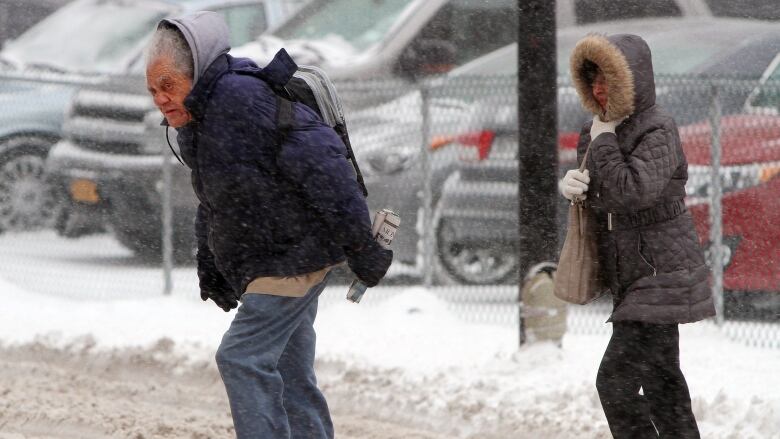City must rethink cold weather alerts, advocates say
Man found dead in bus shelter ID'd as 55-year-old Shabbir Jaffa

Advocates continued to call for a review of Toronto's extreme cold weather policy on Wednesday as city officials confirmed the man found dead in a bus shelter on Tuesday died from exposure.
ShabbirJaffa, 55, was one of two homeless men who died on city streets earlier this week. He was found wearing only jeans and a T-shirt in a bus shelter inYonge-DundasSquare, less than 24 hours after another man was found dead in an abandoned truck.
Sources, who identifiedJaffato CBC News, said he was often seen aroundYonge-DundasSquare and the nearby Eaton Centre.
- Deaths of 2 men during cold snap prompt call for action
- Man dies after being found unconscious in bus shelter
- Body found in abandoned truck
Advocates gathered on that corner Wednesdaynear a makeshift memorial of flowers and other itemsurging the city to rethink its cold weather policy, which typically opens emergency shelters once the temperature drops to -15 C.
Temperatures hit -14 C the nightJaffadied, but with the windit felt like -18 C.
The policy should be more flexible and account for the wind chill, said Tanya Gulliver-Garcia.
"Sticking to something that's so rigid means we're not taking into account other factors," Gulliver-Garcia told reporters.
"If it's -10 and there's a strong wind, it could feel like -20 the way it impacts our bodies is actually colder than when it's a pure -15 with no wind."
The city issued an extreme cold weather alert on Wednesday morning, openingthee 24-hour emergency sheltersin the downtown core. Separately, an extreme cold weather warning for the cityremainedin effect with Environment Canada.
By evening the temperature, with the wind, felt like -30 C, cold enough to freeze exposed skin in just ten minutes.
Fingers, toes freeze first
"It's the wind plus the cold that actually determines how quickly your skin freezes," Dr. BrettBelchetz told CBC News.
Belchetzsays many frostbite cases involve stranded motorists or the homeless who did not have adequate protection for their hands or feet.
Fingers and toes freeze first, he said, because the body will redirect blood to keep the head and torso warm.
"Your body is trying to keep your core warm that's why you'll tend to see skin going red in those areas," he said.
At the first sign of frostbite often tingling or numbness in the extremities it is important to head indoors as soon as possible and warm up thoroughly.
Mayor John Tory has said the city needs to fix the protocol for extreme cold weather alerts.
Toronto Public Health, which oversees the alerts, said it has yet to receive a formal request for a policy review from Tory's office, but added that they would have "absolutely no concerns or issues with such a request."
With files from Shannon Martin and Canadian Press












_(720p).jpg)


 OFFICIAL HD MUSIC VIDEO.jpg)
.jpg)



























































































